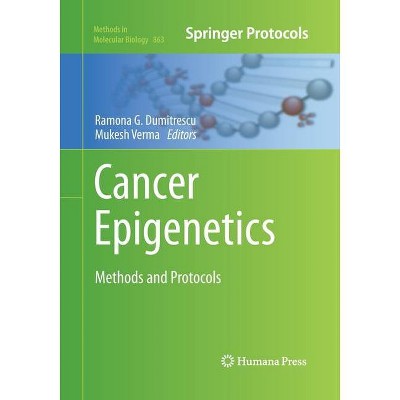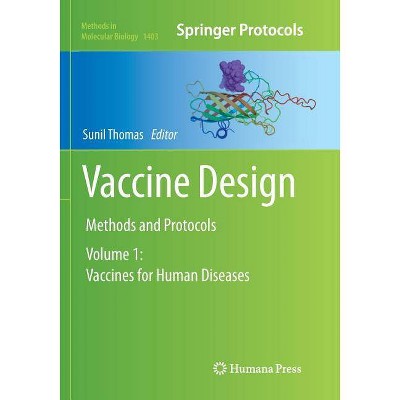Cancer Epigenetics - (Methods in Molecular Biology) by Ramona G Dumitrescu & Mukesh Verma (Paperback)

Similar Products
Products of same category from the store
AllProduct info
<p/><br></br><p><b> About the Book </b></p></br></br>This Methods in Molecular Biology(TM) volume reviews epigenetic changes in different tumor types and outlines currently available technologies for detecting epigenetic changes. Includes detailed descriptions and implementation advice for optimal lab results.<p/><br></br><p><b> Book Synopsis </b></p></br></br><p><sup> </sup>Part I: Early Epigenetic Events in Cancer</p><p> 1. Epigenetic Markers of Early Tumor Development</p><p>Ramona G. Dumitrescu</p><p>2. Epigenetics of Solid Cancer Stem Cells</p><p>Alok Mishra<sup> </sup>and Mukesh Verma</p><p> Part II: Cancer Specific Type Epigenetic Changes</p><p>3. DNA Methylation and Histone Modifications in Breast Cancer</p><p>Ramona G. Dumitrescu</p><p> 4. DNA Methylation Changes in Prostate Cancer</p><p>Wolfgang Goering, Michael Kloth, Wolfgang A. Schulz</p><p>5. DNA Methylation in Promoter Region as Biomarkers in Prostate Cancer</p><p>Mihi Yang and Jong Y. Park</p><p> 6. Epigenetics of Bladder Cancer</p><p>Wun-Jae Kim and Yong-June Kim </p><p> <b>7. Epigenetics in Myeloid Malignancies</b></p><p><b>Stefan Deneberg</b></p><p> 8. The Epigenetics of Brain Tumors</p><p>Adrian M. Dubuc, Stephen Mack, Alexander Unterberger, Paul A. Northcott and Michael D. Taylor</p><p>9. DNA Methylation Changes in Cervical Cancers</p><p>Qiang Lu, Dehua Ma, Shuping Zhao</p><p>10. Epigenetics of Colon Cancer</p><p>Sharad Khare and Mukesh Verma</p><p>11. Promoter Methylation in Head and Neck Tumorigenesis</p><p>Josena K. Stephen, Kang Mei Chen, Shaleta Havard, Glynis Harris, Maria J. Worsham</p><p> 12. Epigenome and DNA Methylation in Oral Squamous Cell Carcinoma</p><p>Mario Pérez-Sayáns García and Abel García-García</p><p>13. Clinical Implications of Epigenetic Alterations in Human Thoracic Malignancies: Epigenetic Alterations in Lung Cancer</p><p>Keiko Shinjo and Yutaka Kondo</p><p> 14. The Role of microRNAs in the Management of Liver Cancer</p><p>Krishna K Banaudha and Mukesh Verma</p> <p>15. Epigenetics in Ovarian Cancer</p><p>L.M.S. Seeber, P.J. van Diest</p><p><sup> Part III: Methods and Technologies used for Epigenetic Changes Detection</sup></p><p><sup> 16. DNA Methylation in Pancreatic Cancer: Protocols for the Isolation of DNA and Bisulfite Modification</sup></p><p><sup>Katja Biewusch, Marie Heyne, Robert Grützmann, Christian Pilarsky</sup></p><p><sup>17.Detection and Analysis of DNA Methylation by Pyrosequencing</sup></p><p>Hilary A. A. Colyer, Richard N. Armstrong, Dr. Daniel J. Sharpe and Ken I. Mills</p><p> 18. Screening for miRNA Experssion Changes using Quantitative PCR (Q-PCR)</p><p>Richard N. Armstrong, Hilary A. A. Colyer, Ken. I. Mills</p><p>19. Genome-wide Methylation Analysis</p><p>Alexander Unterberger, Adrian M. Dubuc and Michael D. Taylor</p><p> 20. Microarray for Epigenetic Changes: Gene Expression Arrays</p><p>Hilary A. A. Colyer, Richard N. Armstrong and Ken I. Mills</p><p>21. Detecting DNA Methylation using the Methylated CpG Island Amplification and Microarray Technique</p><p>Hiliary A. A. Colyer, Margaret Dellett and Ken I. Mills</p><p>Part IV. Factors that Influence the Epigenetic Changes in Cancer</p><p>22. Nutrigenomics-Implications for Breast and Colon Cancer Prevention</p><p>Gabriela Riscuta and Ramona G. Dumitrescu</p><p>23. Dietary and Lifestyle Factors of DNA Methylation</p><p>Unhee Lim and Min-Ae Song</p><p> 24. Diet, Epigenetics and Cancer </p><p> Joseph L. Su </p><p> 25. Role of Epigenetics in Cancer Health Disparities</p><p>Sulma I. Mohammed, Sanya Springfield, and Rina Das</p><p>26. Multifactorial Etiology of Gastric Cancer</p><p>Rosa A. Sierra, Jovanny Zabaleta<sup><p></sup></p> <p>Part V. Epigenetic Epidemiology</p><p> 27. Epigenetic Epidemiology for Cancer Risk: Harnessing Germline Epigenetic Variation</p><p>Kevin Brennan and James M. Flanagan</p><p> 28. Epigenetic Biomarkers in Cancer Epidemiology</p><p>Mukesh Verma</p><p/><br></br><p><b> From the Back Cover </b></p></br></br><p>The epigenetic regulation plays an important role in normal development and maintenance of tissue specific genes expression in humans and the disturbance of these patterns lead to changes involved in tumor formation. More recently, epigenetic changes have been observed in early stages of tumor development and together with the genetic alterations have been defined as abnormalities, necessary for cancer initiation and progression. In, <i>Cancer Epigenetics: Methods and Protocols, </i> expert researchers reviewed these epigenetics changes in different tumor types and described several technologies that are currently available to detect epigenetic changes. These technologies have lead to a better understanding of the processes in normal and cancerous cells. Written in the highly successful <i>Methods in Molecular Biology</i>(TM) series format, the chapters include the kind of detailed description and implementation advice that is crucial for getting optimal results in the laboratory.</p><p>Thorough and intuitive, <i>Cancer Epigenetics: Methods and Protocols</i> aids scientists in continuing to study epigenetic alterations used in clinical practice as biomarkers of early cancerous lesions or markers of progression and prognosis.</p><p/><br></br><p><b> Review Quotes </b></p></br></br><br><p>From the reviews: </p>"This book provides a clear description of the epigenetic changes in cancer that are important in early detection, progression, and prognosis, as well as the design of therapeutic tools necessary to combat cancer. ... This is an excellent resource for scientists and oncologists interested in learning about currently available technologies to detect epigenetic changes that serve as biomarkers in detection of early cancerous lesions as well as markers of cancer progression and prognosis." (Omer Iqbal, Doody's Book Reviews, August, 2012)<br>
Price History
Price Archive shows prices from various stores, lets you see history and find the cheapest. There is no actual sale on the website. For all support, inquiry and suggestion messagescommunication@pricearchive.us


















